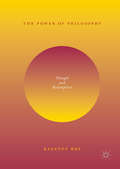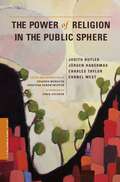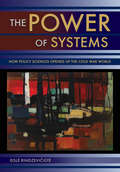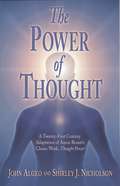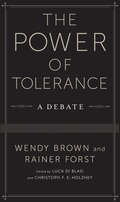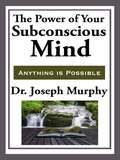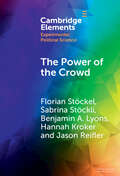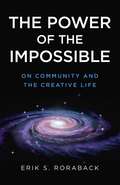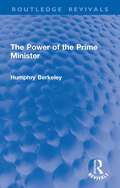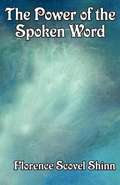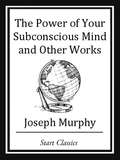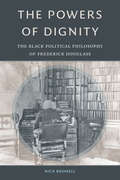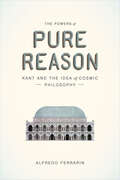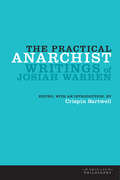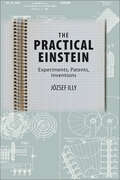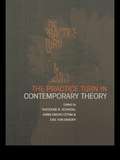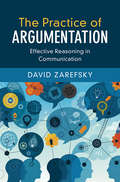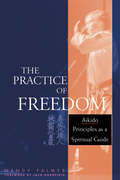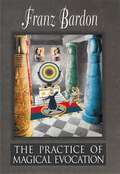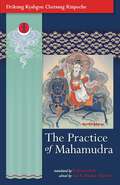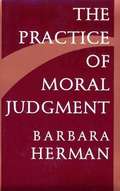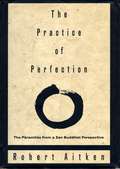- Table View
- List View
The Power of Philosophy: Thought And Redemption
by Kaustuv RoyThis book explores the possibility of philosophical praxis by weaving an ontological thread through four principal thinkers: Heidegger, Schelling, Goethe, and Heraclitus. It argues that a special kind of redemptive power awaits the structural understanding of thought that is beyond semantic formations such as concepts and ideational systems. The author claims that the “power” is negative in nature, trans-personal, and derived directly from the understanding of thought as a structural pulse. The book travels backwards in time, encountering successively Heidegger’s critique of calculative thinking, Schelling’s Mind/Nature relation, Goethe’s Delicate Empiricism, and the aphoristic wisdom of Heraclitus in search of a redemptive power that lies in the self-knowledge of thought. This power is ontological and not historical or developmental; it is the same at all times and all points of history. The author refers to the praxis as “philosophical bilingualism.”
The Power of Religion in the Public Sphere (A Columbia / SSRC Book)
by Cornel West Charles Taylor Judith Butler Jurgen HabermasThe Power of Religion in the Public Sphere represents a rare opportunity to experience a diverse group of preeminent philosophers confronting one pervasive contemporary concern: what role does-or should-religion play in our public lives? Reflecting on her recent work concerning state violence in Israel-Palestine, Judith Butler explores the potential of religious perspectives for renewing cultural and political criticism, while Jürgen Habermas, best known for his seminal conception of the public sphere, thinks through the ambiguous legacy of the concept of "the political" in contemporary theory. Charles Taylor argues for a radical redefinition of secularism, and Cornel West defends civil disobedience and emancipatory theology. Eduardo Mendieta and Jonathan VanAntwerpen detail the immense contribution of these philosophers to contemporary social and political theory, and an afterword by Craig Calhoun places these attempts to reconceive the significance of both religion and the secular in the context of contemporary national and international politics.
The Power of Systems: How Policy Sciences Opened Up the Cold War World (Cornell Studies In Classical Philology Ser.)
by Egle RindzeviciuteIn The Power of Systems, Egle Rindzeviciute introduces readers to one of the best-kept secrets of the Cold War: the International Institute of Applied Systems Analysis, an international think tank established by the U.S. and Soviet governments to advance scientific collaboration. From 1972 until the late 1980s IIASA in Austria was one of the very few permanent platforms where policy scientists from both sides of the Cold War divide could work together to articulate and solve world problems. This think tank was a rare zone of freedom, communication, and negotiation, where leading Soviet scientists could try out their innovative ideas, benefit from access to Western literature, and develop social networks, thus paving the way for some of the key science and policy breakthroughs of the twentieth century.Ambitious diplomatic, scientific, and organizational strategies were employed to make this arena for cooperation work for global change. Under the umbrella of the systems approach, East-West scientists co-produced computer simulations of the long-term world future and the anthropogenic impact on the environment, using global modeling to explore the possible effects of climate change and nuclear winter. Their concern with global issues also became a vehicle for transformation inside the Soviet Union. The book shows how computer modeling, cybernetics, and the systems approach challenged Soviet governance by undermining the linear notions of control on which Soviet governance was based and creating new objects and techniques of government.
The Power of Thought
by Shirley J. Nicholson John AlgeoThought is not just something subjective in our heads, says early Theosophist, Annie Besant. Thought is power, real, objective power. Moreover, the thoughts we create have a life of their own. They have a kind of material reality that affect other people for good or ill. So, is our responsibility to choose. Teaching us to use the power of thought well, is the purpose of this metaphysical book. Leading contemporary Theosophists have added practical exercises and modernized Besants language to make her timeless truths accessible for learning.
The Power of Thought
by John Algeo Shirley J NicholsonTheosophist Annie Besant (1847-1933) drew from the ancient wisdom of the East to explore the deep recesses of the mind. The original edition was published in 1903 and has been in print ever since. Now leading contemporary Theosophists have painstakingly revised the text to free its timeless truths from the time-bound language of the early twentieth century and make it more accessible to today's readers. The result is a clear discussion of subjects of increasingly high interest: concentration, memory, consciousness, telepathy, sleep and dreams, cultivation of the will, and access to your higher self.
The Power of Tolerance: A Debate (New Directions in Critical Theory)
by Wendy Brown Rainer ForstWe invoke the ideal of tolerance in response to conflict, but what does it mean to answer conflict with a call for tolerance? Is tolerance a way of resolving conflicts or a means of sustaining them? Does it transform conflicts into productive tensions, or does it perpetuate underlying power relations? To what extent does tolerance hide its involvement with power and act as a form of depoliticization?Wendy Brown and Rainer Forst debate the uses and misuses of tolerance, an exchange that highlights the fundamental differences in their critical practice despite a number of political similarities. Both scholars address the normative premises, limits, and political implications of various conceptions of tolerance. Brown offers a genealogical critique of contemporary discourses on tolerance in Western liberal societies, focusing on their inherent ties to colonialism and imperialism, and Forst reconstructs an intellectual history of tolerance that attempts to redeem its political virtue in democratic societies. Brown and Forst work from different perspectives and traditions, yet they each remain wary of the subjection and abnegation embodied in toleration discourses, among other issues. The result is a dialogue rich in critical and conceptual reflections on power, justice, discourse, rationality, and identity.
The Power of Your Subconscious Mind
by Joseph MurphyThe Power of Your Subconscious Mind, one of the most brilliant and beloved spiritual self-help works of all time, can help you heal yourself, banish your fears, sleep better, enjoy better relationships and just feel happier. The techniques are simple and results come quickly. Read. Learn. Apply. You can change your life for the better.
The Power of the Crowd: How the Public Can Both Spoil and Improve Social Media as a Source of Information (Elements in Experimental Political Science)
by Jason Reifler Florian Stöckel Sabrina Stöckli Benjamin A. Lyons Hannah KrokerThis Element explores misinformation as a challenge for democracies, using experiments from Germany, Italy, and the UK to assess the role of user-generated corrections on social media. A sample of more than 170,000 observations across a wide range of topics (COVID, climate change, 5G etc.) is used to test whether social corrections help reduce the perceived accuracy of false news and whether miscorrections decrease the credibility of true news. Corrections reduce the perceived accuracy of misinformation, but miscorrections can harm perceptions of true news. The Element also assesses the mechanisms of social corrections, finding evidence for recency effects rather than systematic processing. Additional analyses show the characteristics of individuals who have more difficulties identifying false news. Survey data is included on characteristics of people who write comments often. The conclusion highlights that social corrections can mislead, but also work as remedy. The Element ends with best practices for effective corrections.
The Power of the Impossible: On Community and the Creative Life
by Erik S. RorabackThe Power of the Impossible surveys cultural figures from Spinoza to popular culture icon Ivan Lendl, to illuminate the challenge and problem of establishing a future-oriented world community and its conceptual intersection with heterogeneous forms of the creative life. 'This original, unorthodox study illuminates our current crises of community formation and creativity in ways unexpected but necessary.' Robert Appelbaum, Uppsala University
The Power of the Prime Minister (Routledge Revivals)
by Humphry BerkeleyOriginally published in 1968, the theme of this book is the decline of the influence of the House of Commons in general and the rise in particular in the power of the Prime Minister. The author looks behind the myths of how our constitution operates to describe what was actually happening in practice in the 2nd half of the 20th Century. The book highlights the way in which the Commons was failing to check and control the executive. It also makes valuable suggestions (which have since been adopted) to set up specialist committees, to consider the principal political issues of the day and how the House of Lords might be reformed.
The Power of the Spoken Word
by Florence Scovel-ShinnOur words have the power to change our lives. By paying more attention to how we speak, and hence how we think, we can change our circumstances for the better. The Power of the Spoken Word will help you make the positive changes that you've always wanted to make.
The Power of your Subconscious Mind and Other Works
by Joseph MurphyA compilation of works by Joseph Murphy including The Power of Your Subconscious Mind, Magic of Faith, and Believe In Yourself
The Power to Destroy: How the Antitax Movement Hijacked America
by Michael J. GraetzHow the antitax fringe went mainstream—and now threatens America&’s futureThe postwar United States enjoyed large, widely distributed economic rewards—and most Americans accepted that taxes were a reasonable price to pay for living in a society of shared prosperity. Then in 1978 California enacted Proposition 13, a property tax cap that Ronald Reagan hailed as a &“second American Revolution,&” setting off an antitax, antigovernment wave that has transformed American politics and economic policy. In The Power to Destroy, Michael Graetz tells the story of the antitax movement and how it holds America hostage—undermining the nation&’s ability to meet basic needs and fix critical problems.In 1819, Chief Justice John Marshall declared that the power to tax entails &“the power to destroy.&” But The Power to Destroy argues that tax opponents now wield this destructive power. Attacking the IRS, protecting tax loopholes, and pushing tax cuts from Reagan to Donald Trump, the antitax movement is threatening the nation&’s social safety net, increasing inequality, ballooning the national debt, and sapping America&’s financial strength. The book chronicles how the movement originated as a fringe enterprise promoted by zealous outsiders using false economic claims and thinly veiled racist rhetoric, and how—abetted by conservative media and Grover Norquist&’s &“taxpayer protection pledge"—it evolved into a mainstream political force.The important story of how the antitax movement came to dominate and distort politics, and how it impedes rational budgeting, equality, and opportunities, The Power to Destroy is essential reading for understanding American life today.
The Powers of Dignity: The Black Political Philosophy of Frederick Douglass
by Nick BromellIn The Powers of Dignity Nick Bromell unpacks Frederick Douglass's 1867 claim that he had “elaborated a political philosophy” from his own “slave experience.” Bromell shows that Douglass devised his philosophy because he found that antebellum Americans' liberal-republican understanding of democracy did not provide a sufficient principled basis on which to fight anti-Black racism. To remedy this deficiency, Douglass deployed insights from his distinctively Black experience and developed a Black philosophy of democracy. He began by contesting the founders' racist assumptions about humanity and advancing instead a more robust theory of “the human” as a collection of human “powers.” He asserted further that the conscious exercise of those powers is what confirms human dignity and that human rights and democracy come into being as ways to affirm and protect that dignity. Thus, by emphasizing the powers and the dignity of all citizens, deriving democratic rights from these, and promoting a remarkably activist, power-oriented model of citizenship, Douglass's Black political philosophy aimed to rectify two major failings of US democracy in his time and ours: its complacence and its racism.
The Powers of Pure Reason: Kant and the Idea of Cosmic Philosophy
by Alfredo FerrarinThe Critique of Pure Reason--Kant’s First Critique--is one of the most studied texts in intellectual history, but as Alfredo Ferrarin points out in this radically original book, most of that study has focused only on very select parts. Likewise, Kant’s oeuvre as a whole has been compartmentalized, the three Critiques held in rigid isolation from one another. Working against the standard reading of Kant that such compartmentalization has produced, The Powers of Pure Reason explores forgotten parts of the First Critique in order to find an exciting, new, and ultimately central set of concerns by which to read all of Kant’s works. Ferrarin blows the dust off of two egregiously overlooked sections of the First Critique--the Transcendental Dialectic and the Doctrine of Method. There he discovers what he argues is the Critique’s greatest achievement: a conception of the unity of reason and an exploration of the powers it has to reach beyond itself and legislate over the world. With this in mind, Ferrarin dismantles the common vision of Kant as a philosopher writing separately on epistemology, ethics, and aesthetics and natural teleology, showing that the three Critiques are united by this underlying theme: the autonomy and teleology of reason, its power and ends. The result is a refreshing new view of Kant, and of reason itself.
The Practical Anarchist: Writings of Josiah Warren (American Philosophy)
by Crispin SartwellThe Practical Anarchist brings to light the work of Josiah Warren, eccentric American genius. Devoting his life to showing the practicality of an astonishing ideal, Warren devoted equal industry to the question of how to make a pair of shoes and how to remake the social world into an individualist paradise.This will be the first chance for many readers to encounter Warren’s writings, and in many cases their first publication since their original appearance in obscure, self-published periodicals, including The Peaceful Revolutionist (1833), the first American anarchist periodical. Moreover, they often appeared in a bizarre experimental typography.This volume presents, out of the welter of bewildering writings left by Warren, a reading text designed for today’ readers and students. It seeks to convey the practical value of many of Warren’s ideas, their continuing relevance.
The Practical Einstein: Experiments, Patents, Inventions
by József Illy2012 Outstanding Academic Title, Choice MagazineAlbert Einstein may be best known as the wire-haired whacky physicist who gave us the theory of relativity, but that’s just one facet of this genius’s contribution to human knowledge and modern science. As József Illy expertly shows in this book, Einstein had an eminently practical side as well.As a youth, Einstein was an inveterate tinkerer in the electrical supply factory his father and uncle owned and operated. His first paid job was as a patent examiner. Later in life, Einstein contributed to many inventions, including refrigerators, microphones, and instruments for aviation. In published papers, Einstein often provided ways to test his theories and fundamental problems of the scientific community of his times. He delved deeply into a variety of technological innovations, most notably the gyrocompass, and consulted for industry in patent cases and on other legal matters. Einstein also provided explanations for common and mundane phenomena, such as the meandering of rivers. In these and other hands-on examples culled from the Einstein Papers, Illy demonstrates how Einstein enjoyed leaving the abstract world of theories to wrestle with the problems of everyday life.While we may like the idea of Einstein as a genius besotted by extra dimensions and too out-of-this-world to wear socks, The Practical Einstein gives ample evidence that this characterization is both incomplete and an unfair representation of a man who sought to explore the intricacies of nature, whether in theory or in practice.
The Practice Turn in Contemporary Theory
by Theodore R. Schatzki Karin Knorr Cetina Eike Von SavignyThis book provides an exciting and diverse philosophical exploration of the role of practice and practices in human activity. It contains original essays and critiques of this philosophical and sociological attempt to move beyond current problematic ways of thinking in the humanities and social sciences. It will be useful across many disciplines, including philosophy, sociology, science, cultural theory, history and anthropology.
The Practice of Argumentation: Effective Reasoning in Communication
by David ZarefskyThis book uses different perspectives on argumentation to show how we create arguments, test them, attack and defend them, and deploy them effectively to justify beliefs and influence others. David Zarefsky uses a range of contemporary examples to show how arguments work and how they can be put together, beginning with simple individual arguments, and proceeding to the construction and analysis of complex cases incorporating different structures. Special attention is given to evaluating evidence and reasoning, the building blocks of argumentation. Zarefsky provides clear guidelines and tests for different kinds of arguments, as well as exercises that show student readers how to apply theories to arguments in everyday and public life. His comprehensive and integrated approach toward argumentation theory and practice will help readers to become more adept at critically examining everyday arguments as well as constructing arguments that will convince others.
The Practice of Freedom
by Wendy Palmer Jack KornfieldIn The Practice of Freedom, American sensei Wendy Palmer applies the basic principles of aikido to the conduct of everyday life. This fifth-degree black belt describes her own fascinating journey, one that includes caring for a mother with multiple sclerosis, teaching inmates in a women's federal prison, and the development her own method of meditation called Conscious Embodiment. In the process Palmer uses her many years of aikido practice to explore and respond to a simple but potent question: How? How can we maintain our vitality and integrity in times of stress? How do we transform our negativity into budo, or love? And how do we move from "stuckness" to freedom?
The Practice of Freedom
by Wendy PalmerIn The Practice of Freedom, American sensei Wendy Palmer applies the basic principles of aikido to the conduct of everyday life. This fifth-degree black belt describes her own fascinating journey, one that includes caring for a mother with multiple sclerosis, teaching inmates in a women's federal prison, and the development her own method of meditation called Conscious Embodiment. In the process Palmer uses her many years of aikido practice to explore and respond to a simple but potent question: How? How can we maintain our vitality and integrity in times of stress? How do we transform our negativity into budo, or love? And how do we move from "stuckness" to freedom?
The Practice of Magical Evocation
by Franz BardonThroughout the ages, and primarily during the past few centuries, many lengthy dissertations have been published on the art of higher magic. Unfortunately, they are for the most part such bewildering and incomplete remnants that very little of it can be taken as a point of reference for practical studies, and this only in small fragments. The original initiative for magic was known only to a very few lodges and was reserved for a particularly chosen few, while for the seekers of truth who searched diligently for any information, this subject matter remained dark and mysterious. Various religions during the Middle Ages were severely hostile towards any magical knowledge. In our history, the most prominent examples are the well known Inquisitions. Later, in modern times, magic was regarded as mere superstition, and any person who showed some inclination toward this knowledge, let alone one seriously concerned himself with the study of magic, was regarded as a fool and was ridiculed. In the past, mystical and other sects maligned magic to such a degree that the word &“magic&” has to this very day an extremely dubious reputation. And any person who has had an appreciation or understanding for magical knowledge has been pilloried as a black magician. In reality, true magic was initially taught in the ancient schools of the prophets, and then only in the highest circles. However, only a few select insiders had access to these institutions. In those days, only a few books occasionally disclosed scant bits of information about true magic. These books were deliberately written in such a way that they would disclose little or nothing even to the most astute reader, and hence they would not give the seeker of truth a complete understanding of the subject of magic. In accordance with the ancient Egyptian Mysteries, the magic of the second Tarot card is represented by the High Priestess. Franz Bardon, the author of The Practice of Magical Evocation, gladly continues to guide the serious, diligent reader and student of magic along the proper path, as long as this person is devoid of any fanatical religious beliefs and erroneous ideology. Furthermore, this person has to be prepared to penetrate further into the mysteries of the knowledge of magic or the Hermetic sciences. As in Franz Bardon&’s first book, Initiation into Hermetics, Bardon endeavors to keep the language of this second volume in a style that is understandable to everyone. The subject matter of the magic of evocation is among the least known and least investigated branches of the art, and therefore Bardon makes certain that every person who reads this book will become completely familiar with this subject matter, not only in theory but above all with the practice, if he so chooses. It is important, however, that the reader know that he will not achieve any results with the practice of magical evocation unless he has successfully completed Step VIII, at the very least, of Franz Bardon&’s first book, Initiation into Hermetics, which is a description of the first tarot card, the Magician. Should Franz Bardon be successful in assisting the reader who has successfully completed the entire practical part of his first book to achieve the same good results with this one, then Bardon has achieved his objective. Those readers who initially study the secret sciences only theoretically will find in this work a satisfactory broadening of their knowledge.
The Practice of Mahamudra
by Drikung Kyabgon Chetsang RinpocheMahamudra, the highest level of teaching within Tibetan Buddhism, rewards study and practice with the realization of the very nature of mind itself. There is not a single experience which is not subsumed within the realizations of Mahamudra. On his first tour of the United States, His Holiness Chetsang Rinpoche gave detailed instructions in Mahamudra methods. He carefully explained each of the five stages of Mahamudra and taught its main meditational practices. He also gave precise instructions on posture and breathing for meditation, and answered many common questions using the teachings of Tilopa and Gampopa to illustrate his various points.
The Practice of Moral Judgment
by Barbara HermanShe urges us to abandon the tradition that describes Kantian ethics as a deontology, a moral system of rules of duty. She finds the central idea of Kantian ethics not in duty but in practical rationality as a norm of unconditioned goodness. This book both clarifies Kant's own theory and adds programmatic vitality to modern moral philosophy.
The Practice of Perfection: The Paramitas from a Zen Buddhist Perspective
by Robert AitkenRobert Aiken, author of Encouraging Words and Taking the Path of Zen, is America's most senior Zen Roshi. In this new book he presents the Ten Pãramitãs, of Transcendental Perfections--namely, giving, mortality, forbearance, zeal, focused meditation, wisdom, compassionate means, aspiration, spiritual power, and knowledge--two-thousand-year-old ideals that can serve us as both methods and goals. The Pãramitãs are the "skillful means" a person may employ to nurture and develop his or her spiritual and moral life. In religious instruction we are often met be restrictions, and are told what not to do. The Pãramitãs, explained from a Zen perspective, offer the seeker ten positive means of action, ten ways to live a life of clarity and grace in a modern world where neither seems easy or even possible. The transcendental perfections can lead us toward a life that is both spiritually invigorated and socially engaged. Aitken Roshi's way of teaching--anecdotal, careful, insightful, and easily accessible--leads us further along the path of harmony and balance. Each of the inspiring and instructional essays in this book is followed by a section in which Aitken answers questions most often asked by his own students in their course of study. The Practice of Perfection will be useful to seekers of all cultures and faiths.
